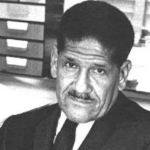As a boy he played alone in the fields
behind our block, six frame houses
holding six immigrant families,
the parents speaking only gibberish
to their neighbors. Without the kids
they couldn't say "Good morning" and be
understood. Little wonder
he learned early to speak to himself,
to tell no one what truly mattered.
How much can matter to a kid
of seven? Everything. The whole world
can be his. Just after dawn he sneaks
out to hide in the wild, bleached grasses
of August and pretends he's grown up,
someone complete in himself without
the need for anyone, a warrior
from the ancient places our fathers
fled years before, those magic places:
Kiev, Odessa, the Crimea,
Port Said, Alexandria, Lisbon,
the Canaries, Caracas, Galveston.
In the damp grass he recites the names
over and over in a hushed voice
while the sun climbs into the locust tree
to waken the houses. The husbands leave
for work, the women return to bed, the kids
bend to porridge and milk. He advances
while beneath him the earth holds its breath.




















Comment form: